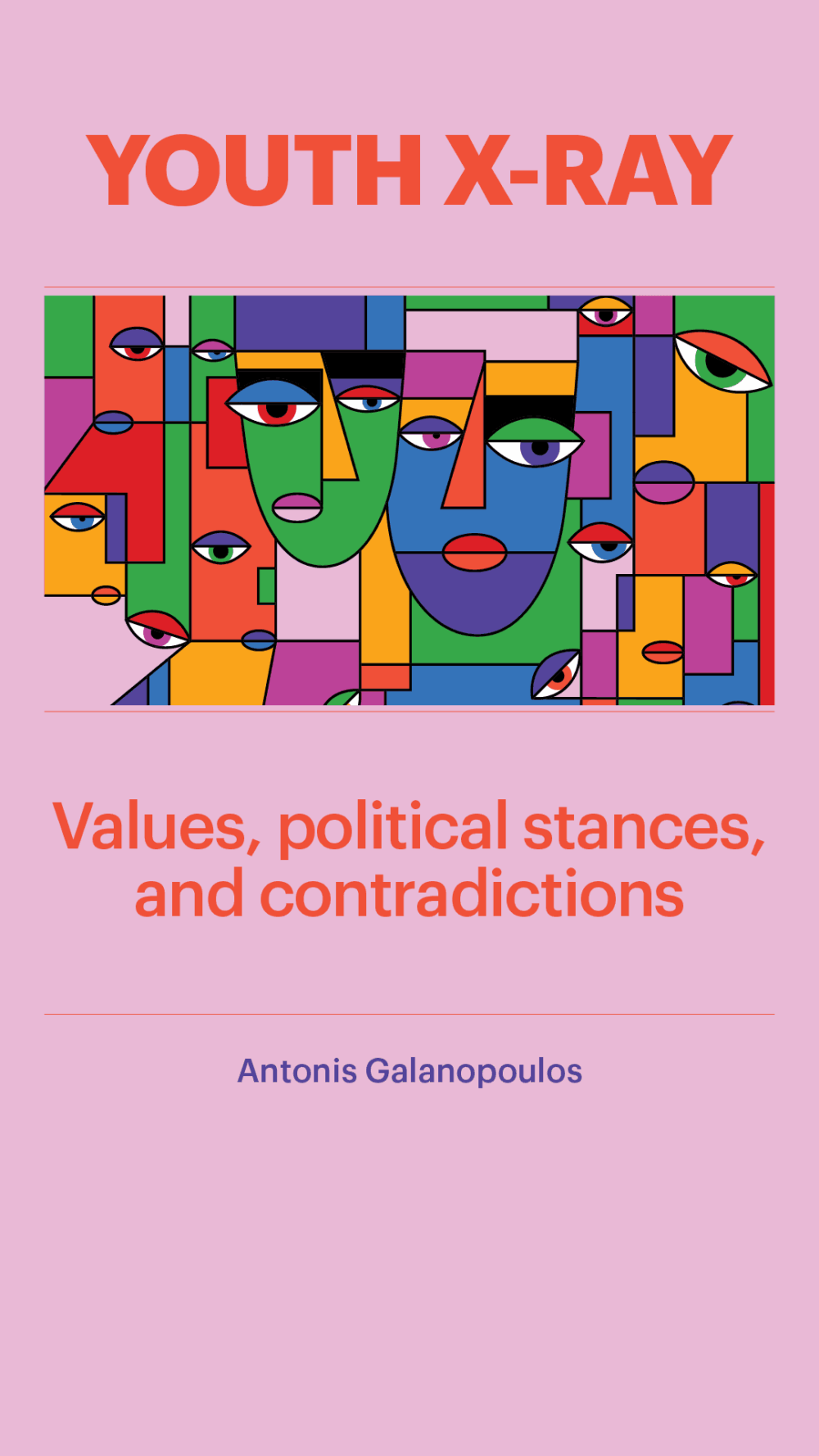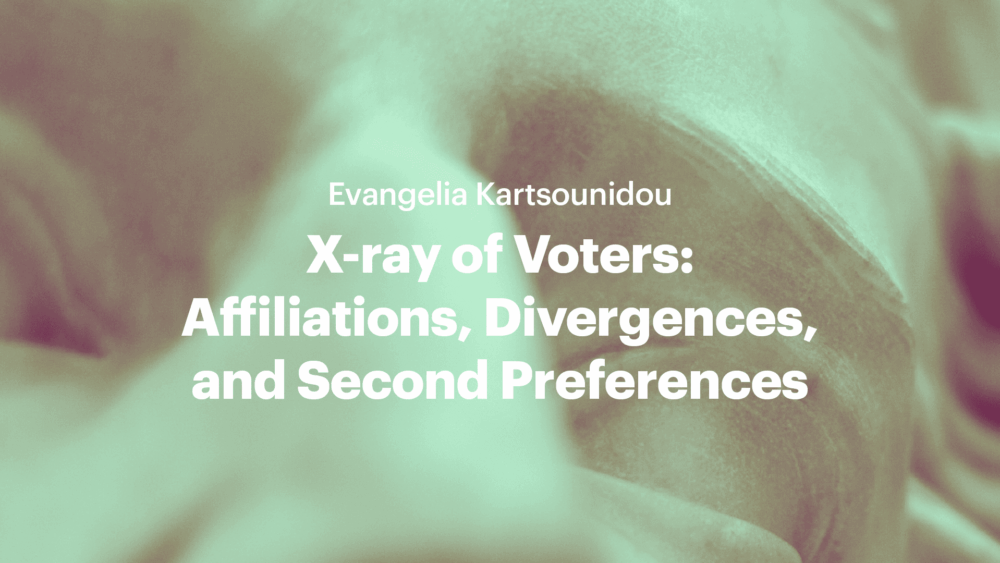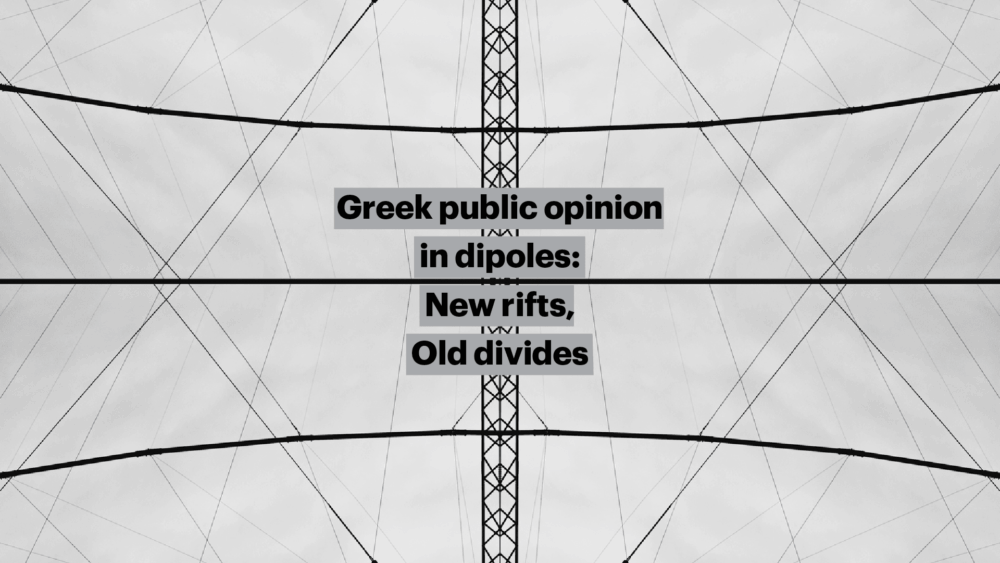
Plunged into darkness: When reality is distorted and there are no alternatives in sight
The results of ETERON’s latest research on the voters’ profile highlight the gap between Nea Dimokratia’s electorate and those of the opposition parties. When it comes to the economic sphere, if we also take into account other public opinion polls, we observe that the ND voters have a positive view of both macroeconomic indicators and state measures to boost the market; moreover, they express confidence in government policies. In contrast, the opposition parties’ electorates are skeptical about the stability of the economy and the effectiveness of fiscal measures, with a significant percentage of voters expressing reservations or even explicit distrust towards the government’s economic narrative.
At the same time, there’s another key difference, which has to do with how people view the quality of democracy and how trustworthy they think institutions are. At a time when the general mobilisation of the population is manifested through a loss of trust in justice and oversight bodies, ND voters appear more optimistic about the course of democratic processes. In contrast, supporters of opposition parties believe that the independence of the judiciary and the functioning of institutions are undermined by interference and inefficiencies, thereby reinforcing feelings of political alienation amongst those electorates.
Economic distress
Among the thirteen political group electorates that participated in the survey, it was found that only 14.7% stated that they were “very or rather satisfied” with their personal financial situation, while a – larger but still not dominant – 21.3% feel “neither satisfied nor dissatisfied”. In contrast, 63.8% of respondents opted for “very” or “rather dissatisfied”, which shows us that the majority of the voters, regardless of their political affiliation, feel strongly dissatisfied with their current financial situation.
However, things get even more interesting when we turn our focus on ND voters. Here, the percentage of those who are “very or rather satisfied” increases to 36.4%, almost double the overall average, while those who are “neither satisfied nor dissatisfied” reach 36.7%. This trend is closer to the profile of the supporters of the far-right ecclesiastical Niki party than to that of the centre-left parties’ electorates: for example, amongst SYRIZA supporters, the corresponding satisfaction rate is only 4.5%, amongst PASOK supporters it’s 15.4% and amongst those of Plefsi Eleftherias, 11.4%. This differentiation suggests that ND voters maintain a relatively more positive view of the economy, despite the broader sense of discontent.
If we add to this the Hellenic Statistical Authority’s (ELSTAT) data on subjective poverty for 2024, according to which 67% of citizens consider themselves to be living in conditions of “subjective poverty” 1 and 26.9% are at risk of poverty2, then an even more complex situation emerges. The contrast between the high rates of subjective poverty and the relatively high satisfaction expressed by ND voters creates a jarring “reality gap”: on the one hand, there is an evident and widespread personal distress, and on the other, there is confidence in the government’s narrative of economic stability.3
In this context, it becomes clear that ND’s “loyal base”, in other words that 22-25% of the party’s electorate that consistently supported it in the recent European elections, still identifies with the government’s narrative of economic recovery and progress. This convergence is no accident: political communication focuses on highlighting measurable indicators of recovery [e.g. lower unemployment rates4, public works, (increased) tourism revenues5], which are presented as “proof” that the economy is already heading in the right direction.
Finally, these views clash directly with recent international comparative studies on the well-being of Greeks compared to previous years: for example, 52% of those surveyed believe that in 20196, under Tsipras’s premiership, their financial situation was better. This perception highlights the sharp polarisation between the “haves” and the “have-nots” – or, more accurately, between those who trust the government’s narrative and those who feel that real life remains tough, despite the strong performance of official indicators. Thus, the political and social divide deepens, rendering the state of the economy not merely a matter of approval or disapproval, but also a key battleground for political confrontation.
Voters on democracy
Amongst the thirteen parties’ electorates, another divide emerges. ND voters express much higher satisfaction with the way democracy is functioning (75.8%) compared to those of all the other parties. They are followed by Nea Aristera with 17.6% and SYRIZA with 13.5%, while the remaining parties score in single digits, with MeRA25 voters giving this view a mere 4.2%. It is clear that support for the ruling party is linked to a more positive assessment of the political framework.
On the other hand, the “dissatisfied or rather dissatisfied” express an almost unanimous disapproval: this ranges from 71.7% amongst PASOK/KINAL voters, 82.4% amongst those of Nea Aristera and reaches over 90% amongst the electorates of most smaller parties (KKE 92.8%, Plefsi Eleftherias 93.2%, MeRA25 95.8%). This overwhelming majority shows that, regardless of party affiliations, there is widespread disappointment with the current functioning of the political system.
Based on recent polls — amid the wiretapping scandal, the failure to investigate the criminal train accident that occured in Tempi, the government’s control over the media, and court rulings that sparked public outcry — trust in the justice system has reached historically low levels.7
Lack of alternatives
It is a major concern that, despite the worsening economic situation in Greece and the country’s return to conditions reminiscent of the 2010 recession, none of the opposition parties has managed to put forward a coherent and convincing alternative economic narrative. The constant reshuffles within SYRIZA, PASOK and Nea Aristera — including internal conflicts and leadership changes — reveal an unstable political landscape8, in which the lack of a unified strategy leaves a gap at a time when citizens are facing increasing difficulties.
Plefsi Eleftherias is attempting a single but unique move: capitalising on the impact of the Tempi train disaster, it has formed a monothematic resistance movement, yet without proposing a comprehensive platform to address economic and social issues. In contrast, the other parties remain trapped in isolated disputes, without offering a credible alternative to the Mitsotakis government’s narrative of “steady growth” and “economic recovery.”
In the international arena, the case of La France Insoumise shows the way forward: in a recent television interview, the party’s leader, Jean-Luc Mélenchon, emphasised that in order to win, the Left must have a comprehensive government programme9. His electoral success10 in France proves that a unifying political and strategic direction that achieves broad consensus among progressive forces and aims to heal long-standing injustices — especially on issues that concern women — can rally support and have a lasting impact. In Greece, however, the majority of the left-wing forces seem to ignore this dimension — a fact that leaves us stranded amidst an ongoing political storm, without a clear compass or common direction.
- https://www.kathimerini.gr/economy/563330206/protathlitria-ypokeimenikis-ftocheias-i-ellada-stin-e-e/[↩]
- https://www.statistics.gr/en/statistics/-/publication/SFA10/2024[↩]
- https://thepressproject.gr/magiki-eikona-gia-tin-oikonomia-apo-mitsotaki-zei-stin-idia-ellada-me-olous-tous-ypoloipous-polites-anarotietai-i-antipolitefsi/[↩]
- https://www.europarl.europa.eu/topics/en/article/20190612STO54312/reducing-unemployment-key-facts-and-eu-measures-explained[↩]
- https://eteron.org/i-katara-toy-ypertoyrismoy-kai-oi-akraies-anisotites/[↩]
- https://www.in.gr/2025/02/21/politics/ereyna-metron-analysis-52-krinei-oti-2019-kyvernisi-aristeras-vriskotan-se-kalyteri-oikonomiki-katastasi/[↩]
- https://www.publicissue.gr/institutions-2024/[↩]
- https://pulserc.gr/1327/%ce%b4%ce%b7%ce%bc%ce%bf%cf%83%ce%ba%cf%8c%cf%80%ce%b7%cf%83%ce%b7-%cf%83%ce%ba%ce%b1%cf%8a-pulse-%ce%b1%cf%80%cf%81%ce%af%ce%bb%ce%b9%ce%bf%cf%82-2025-%ce%b8%ce%b5%cf%84/[↩]
- https://x.com/broderly/status/1917302733536911701[↩]
- https://www.politico.eu/article/france-legislative-election-2024-second-round-front-populaire-jean-luc-melenchon-raphael-glucksmann-shock-victory/[↩]



